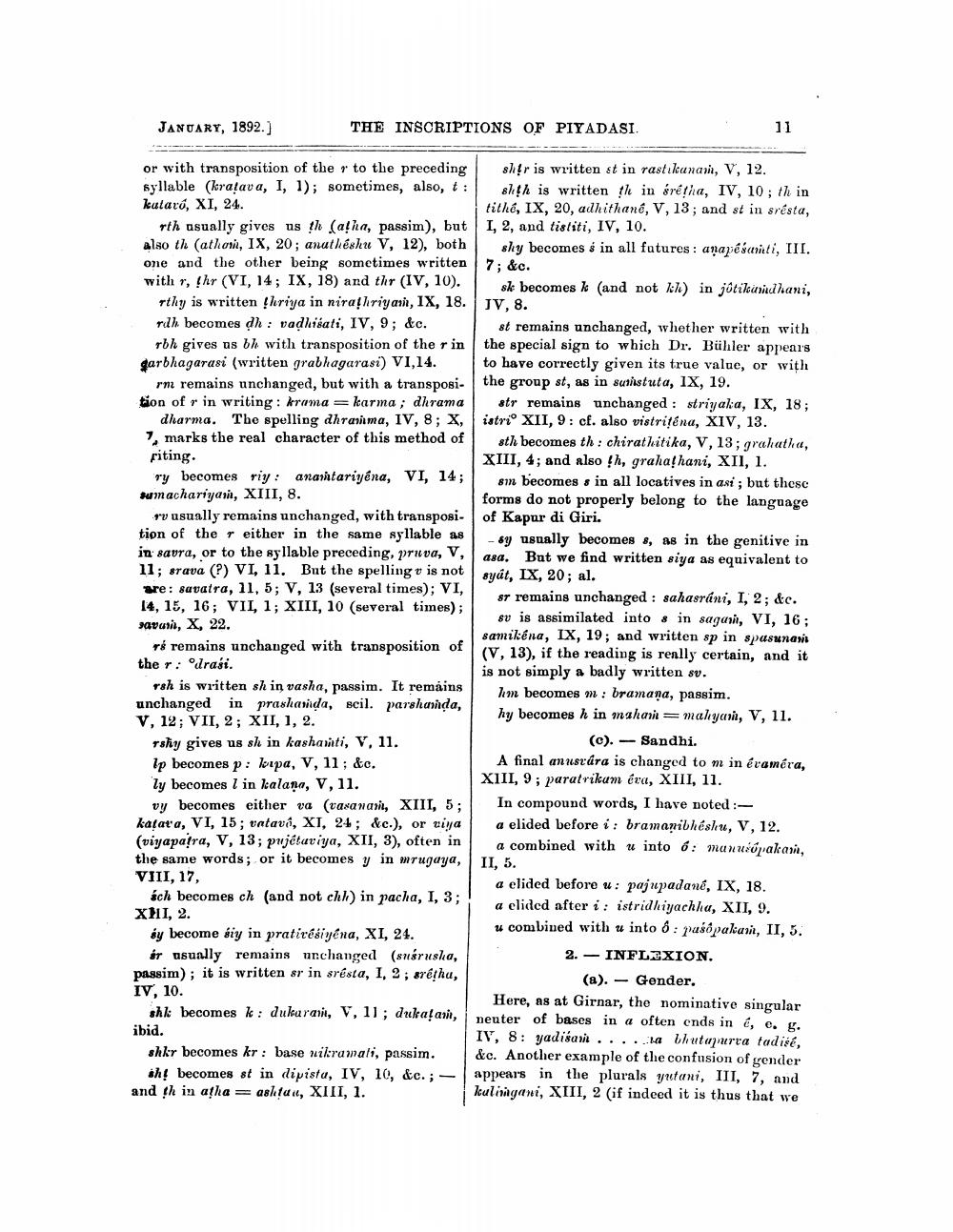________________
JANUARY, 1892.]
THE INSCRIPTIONS OF PIYADASI.
11
or with transposition of the r to the preceding sh!r is written st in rastıkunari, V, 12. syllable (kraţava, I, 1); sometimes, also, t:
shth is written th in órétha, IV, 10; th in kataró, XI, 24.
tithé, IX, 20, adhithané, V, 13; and st in srésta, rth asually gives us thatha, passim), but I, 2, and tistiti, IV, 10. also th (athon, IX, 20; anatheshu v, 12), both shy becomes s in all futures: anapésariti, III. one and the other being sometimes written 7; &c. with r. thr (VI, 14; IX, 18) and thr (IV, 10). sk becomes k (and not kn) in jótikuidhani,
Tthy is written thriya in nirathriyar, IX, 18. JV, 8. rih becomes dh : vadhisati, IV, 9; &c.
st remains unchanged, whether written with rbh gives us bh with transposition of the r in the special sign to which Dr. Bühler appear's garbhagarasi (written grabhagarasi) VI, 14. to have correctly given its true value, or with
rm remains unchanged, but with a transposi- the group st, as in suistuta, ix, 19. tion of r in writing: krama = karma; dhrama str remains unchanged: striyaka, IX. 18;
dharma. The spelling dhrarma, IV, 8; X, istrio XII, 9: cf. also vistriténa, XIV, 13. 7, marks the real character of this method of sth becomes th: chirathitika, V, 13; grahatha, riting.
XIII, 4; and also th, graha! hani, XII, 1. ry becomes riy: ananitariyena, VI, 14;
ein becomes o in all locatives in ani; but these sumachariyani, XIII, 8.
forms do not properly belong to the language rv usually remains unchanged, with transposi- of Kapur di Giri. tion of the r either in the same syllable as - sy usually becomes e, as in the genitive in in savra, or to the syllable preceding, pruva, V, asa. But we find written siya as equivalent to 11: erava (?) VI, 11. But the spelling is not svát, IX, 20; al. are: savatra, 11, 5; V, 13 (several times); VI,
sr remains unchanged : sahasrani, I, 2; &c. 14, 15, 16; VII, 1; XIII, 10 (several times); savuri, X, 22.
sv is assimilated into o in sagani, VI, 16;
samikéna, IX, 19; and written sp in spusunani re remains unchanged with transposition of
(V, 13), if the reading is renlly certain, and it the r: "drasi.
is not simply a badly written sv. rsh is written sh in vasha, passim. It remains
hem becomes m : bramana, passim. unchanged in prashanda, scil. parshanda, V, 12; VII, 2; XII, 1, 2.
hy becomes h in mahai=mahyar, V, 11. rshy gives us sh in kashanti, v, 11.
(c). - Sandhi. lp becomes p: krpa, V, 11 ; &c.
A final an ustúra is changed to m in évaméra, ly becomes l in kalana, V, 11.
XIII, 9; paratrikum éra, XIII, 11. vy becomes either va (vasanan, XIII, 5; In compound words, I have noted :katata, VI, 15; vatavá, XI, 24; &c.), or viya a elided before i : bramanibhéshu, v, 12. (viyapatra, V, 13; pujétaviya, XII, 3), often in a combined with u into 6 : manuzőpakari, the same words; or it becomes y in mrugaya, II, 5. VIII, 17,
a elided before u: pajupadané, IX, 18. éch becomes ch (and not chl) in pacha, 1, 3;
a elided after i : istridhiyachhu, XII, 9. XMI, 2. sy become siy in pratirésiyena, XI, 24.
u combined with u into ô: pasopakari, II, 5. ir usunlly remains unchanged (suéruska,
2. — INFLEXION. passim); it is written sr in sresta, I, 2; sréthu,
(a). - Gender. IV, 10.
Here, as at Girnar, the nominative singular shk becomes k: dukuranit, V, 11; dukafani, neuter of bases in a often ends in é, e. g. ibid.
IV, 8: yadićani.....athutapurva tadisé, shkr becomes kr : base nikrawali, passim. &c. Another example of the confusion of gender
sh! becomes st in dipista, IV, 10, &c.; - appears in the plurals yutani, III, 7, and and th in atha = ashtu, XIII, 1.
kulingani, XIII, 2 (if indeed it is thus that we




